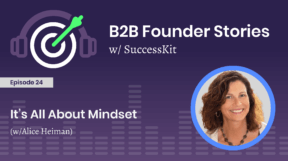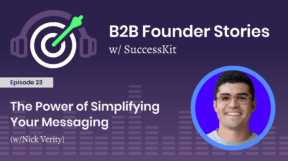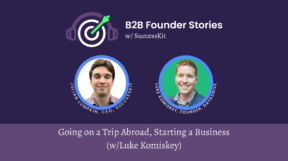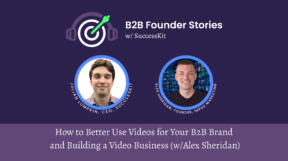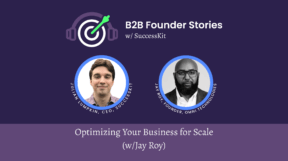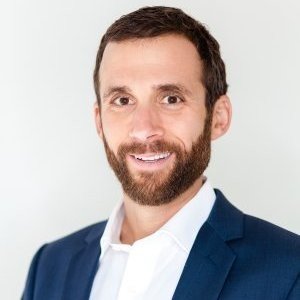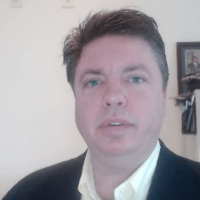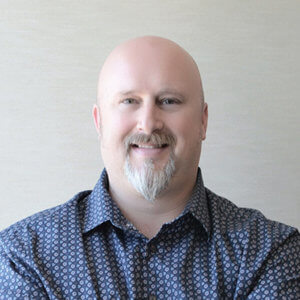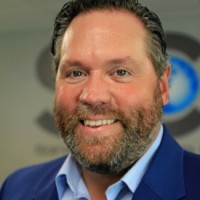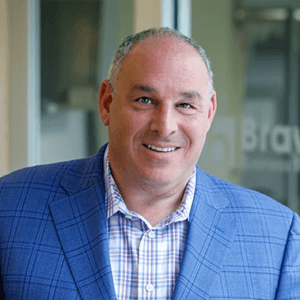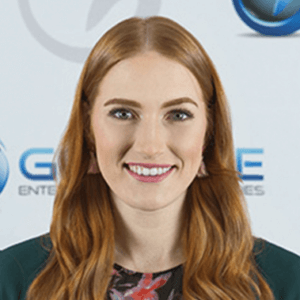Listen to this episode now on Spotify or Apple!
In this episode of our B2B Founder Stories podcast, Julian talks to Renée Safrata, the founder and CEO of Vivo Team Development. Renée describes how she began her career as an interior designer and made the pivot to solopreneur and entrepreneur in the male-dominated technology sector. She also speaks to the importance of mentorships and details the key goals of Vivo and how the COVID-19 pandemic impacted her company in a positive way.
“It doesn’t matter what route you’ve taken in your career, you can pivot within your career, if you get the right insights and understandings about how you are developing yourself and how you’re recognizing other to develop them.”
Renée Safrata, Vivo Team Development
Transcript of Podcast Episode 6: Growing a Small Tech Biz as a Woman in a Male-Dominated Industry (w/Renée Safrata, Founder and CEO of Vivo Team Development)
Julian Lumpkin: Thanks for tuning into B2B Founder Stories w/ SuccessKit. My name is Julian. I am the host and the founder of SuccessKit. My guest today is Renée Safrata, the founder and CEO of Vivo. In this conversation, we talk about taking the entrepreneurial path versus being an executive, and the good and bad that come with both of those decisions. We talk about having a lean team and the opportunity that presents for a founder or CEO. We talk about working with women-owned businesses and why that’s so important to her, among other things.
Julian Lumpkin: A quick note, that if you enjoy this podcast, please do leave us a review, wherever you’re listening. These reviews matter a lot in making sure people who would benefit from this content actually find us. Finally, if you have ideas for future guests or questions, you can email me directly anytime at [email protected], that’s [email protected]. I hope you enjoy my conversation with Renée.
Julian Lumpkin: Really excited to share your story with our audience. To begin, can you quickly tell us about Vivo, the company you founded?
Renée Safrata: Yeah. Vivo is a methodology business. Our core offering is leadership development and team effectiveness, and we spice that up with a learning experience platform and behavioral analytics. So what we’re doing is we’re helping leaders and teams out there in the world just get better at what they need to do in their workspace. We develop their competence, their motivation, their collaboration. And we do that all with online training, group coaching, and people analytics, which we absolutely love.
Julian Lumpkin: Awesome. And it looks like you started Vivo about 10 years ago, so let’s kind of rewind back to that time. What were you doing before Vivo that led you to ultimately start the company?
Renée Safrata: It’s been an interesting career pivot for me. I’ve been a solopreneur and an entrepreneur throughout my career. Vivo Team is actually my fifth business venture. So to answer your question, Julian, before that, I guess, I was sort of figuring out the landscape to get me to Vivo Team. So I’ve owned and operated a number of businesses throughout my career.
Renée Safrata: I started actually as a registered interior designer. That was how I started to understand what my passion was. I developed, over a period of time, a deep understanding that my passion was figuring out why does one team completely understand how to collaborate at a high level, while another team is sort of looking for that key to unlock the secret sauce? And I couldn’t figure it out. I was scratching my head, but I realized really the architectural and design world for me was giving me an idea of what my true passion was. So a big pivot for me in my career at that time.
Julian Lumpkin: Can you walk us through how you made that pivot? You mentioned being a solo entrepreneur, did you start by just kind of consulting yourself? How did you go from kind of seeing a trend as an interior designer to starting a leadership development company that’s now grown to a decent scale?
Renée Safrata: And how did I become now a businesswoman in tech, right? It is an interesting pivot, and people ask me about it all the time. I was educated as an interior designer. I wrote my registration exams and qualification exams in New York. I had the benefit of a father and a mentor who told me very, very early on, “Listen, listen, listen, and do your own thing as quickly as possible.” So you’re right, I started a small boutique interior design company out of my home in Toronto. I would read marketing journals to figure out who was moving their offices. And I’d basically cold call in and I’d say, “Hey, I can design your office.”
Renée Safrata: Or I’m a really good skier, and I would call the ski club that I skied at to say, “Who have you got coming in as far as businesses this week.” And I’d jump in my car and I’d go skiing for the day, so that I could get on the chairlift as a single and start having conversations with people to get business. So I was very creative in outbound, kind of marketing and sales to get projects. And what ended up happening was I did a number of residential renovations in the city of Toronto, then I sort of moved into 1000 square foot retail shops in malls.
Renée Safrata: And it was quite funny, because I would put people in and sadly it was a bit of a recession in Toronto, and I would take them out pretty it quickly as well. So I was just sort of rotating 1000 square foot spaces with new owners and tenants. Had great relationships with mall operators, who would just pick up the phone and go, “Hey, Renée, we got another one, let’s put them in.”
Renée Safrata: So that gave me my residential and retail experience. And what I realized along the path was that there was a piece missing. And I think that’s probably what drives me as a solopreneur, and now into an entrepreneur, is this whole idea of what’s missing. What can we do differently? And what was missing in that whole market was this idea of really aligning owners and operators, entrepreneurs of companies with how their space was going to look and feel? And what their customer experience was going to look like?
Renée Safrata: So I developed a sort of brainstorming kind of strategic, let’s look at what the future is for your business piece. And I think that started tapping me into this whole idea of why can’t we all collaborate to get a specific outcome. When I started doing that, my clientele went from 1000 square foot spaces to networks of retailers that had 10 locations, and then it quickly grew to big-box retailers that had over a hundred locations.
Renée Safrata: So I ended up being a consultant, an expert in that brainstorming collaborative, I think, I called it the jam session at that time. Working with clients to figure out, in every it of their retail environment, how could they have the same look and feel, essentially? I really realized, Julian, that being on a plane in my early 30s every three days and working throughout North America was not for me. I wanted to have a family and I was just getting exhausted.
Renée Safrata: So to answer your question of how did I start to make the pivot? I started to realize that in those conversations I was presenting to large boardrooms with many different types of men. You can imagine this was in the late ’80s, no, probably, more early to mid ’90s. So being a female owner in the US, at the strategic table, having these kinds of conversations with companies about how they were going to retrofit their 100 locations were big conversations. I could really recognize that there were some people that did not understand what I was contributing and were actually somewhat ignoring me.
Renée Safrata: So instead of taking that as an affront, I decided to put together a series of archetypes of those men. And I went into my network and I asked those men, if they would mentor me. Look at my failures and successes of my career so far, and help me understand what was my true passion. And that’s what really got me to pivot at the seven-month mark working with those four men, one of those men came to me and said, “I don’t think architecture and design is actually your real love. I think it’s this whole idea of people and collaboration and your passion for how can you disrupt things, so let’s look at that.” And that’s what started my pivot.
Julian Lumpkin: When you decided to make that pivot, was it really a big conscious choice and change? Was it like, “All right, I’m going to get out of the architecture design business. I’m going to start something new”? Or did it continue to kind of just evolve into it? Or was there kind of a dramatic pivot point?
Renée Safrata: Yeah, that was a dramatic pivot point, because I actually had to shut down everything that I was doing. By the way, I had moved to the West Coast of Canada at that point, so I was living in Vancouver, British Columbia. So I had to shut down and join forces with, that was another company that I owned, so join forces and sort of step into the newness. So really in that pivot, it was taking the risk to just stop something and start something new, which I’ve done set several times, obviously. And it was also the pivot to be open to feedback, to learn some new things. I learned about group behaviors, I studied, and you can imagine, this is then the follow on is going to be that education brought me into the whole idea of our analytics of at Vivo Team, and really looking at behaviors in collaboration.
Renée Safrata: So I had to learn a whole bunch of new stuff, and I had to kind of unlearn what I had learned. For example, what I will say about that is, when you are looking from being a consultant and interior designer, and responsible for a number of different codes and buildings, and your drawings have to be specific, you have to be very, very detailed. I learned how to unlearn that behavior of being so detailed and looking more at the strategies of outcomes of projects. And I essentially built my strategic acumen, I would say, by listening to all of the people that I was working with. So I would say deep listening, unlearning, and just taking a risk to do something different.
Julian Lumpkin: That’s really interesting. And it’s amazing, I interview a lot of entrepreneurs like yourself, how consistent some of these themes are of staying open-minded, listening, and pivots. And that’s not always what you hear about on LinkedIn or in the media, when it comes to starting a business. When you started Vivo, it sounds like you had been a solo entrepreneur, a solopreneur as well as partnered with other companies. Was there an explicit goal, when you started, to really grow this into a more scaled business? Or did that just kind of develop naturally?
Renée Safrata: Let me speak to that from two ways. Let me speak to that from personal interest, excitement, aliveness, and let me speak to that from a professional, what did I, we, I’m going to say, because I did have some partners helping me with this, believe we could disrupt from a professional perspective. So let’s start with this. The Vivo Team is entering its 10th year, we’ll be 10 in November, this year, in 2022, but two years before I incorporated the company, and we started to market our services, we decided to stop everything, do a bucket load of research, and look at learning development and, essentially, study the workplace of 2020.
Renée Safrata: We never expected a pandemic, but we wanted to study what was going to happen in the workplace, when five generations would be sitting side by each. We took a year and a half, two years to look at how behavioral science could disrupt the way people were thinking about their teams and their leaders. Because even if you look today, still people are looking at personality profiles and personality assessments. We’re big believers that we don’t want to put people in a box. We actually want to collaborate and develop people.
Renée Safrata: But once we put them into a box by telling them they’re a green hat or they’re a red hat or a blue hat or an ENTJ, we’ve stopped a part of the conversation. So we decided that if we could look at behaviors and we could identify within the system of teams and leaders, that family system theory of a leader with a team, we could look at a collection of behaviors and see which ones were impacting results, and which ones were promoting better results. Then we had something to talk about, and we weren’t stifling people by telling them, “This is who you are and you should stay in that box” kind of thing.
Renée Safrata: So it was a lot about that. Just taking the time out and researching and having a big belief, we can disrupt the way things are going, and we can disrupt it in such a way that we can be a global company. So today, 10 years later, Vivo Team has definitely been spring-boarded by this whole COVID piece, because we decided to disrupt the way we were doing business 10 years ago and do everything digitally, do everything work from home. And when I say everything, I don’t even mean just the delivery of our products, but how we sell, how we operate the company, how we collaborate as a team.
Renée Safrata: So our team is in Vancouver, Toronto, and Halifax, but we have a global footprint. We have buyers in 19 countries. And so that’s been really exciting to be a small team, but to have such an expansive experience. What I would say about that as something that has excited me, is that during COVID, because we were speaking to so many leaders and teams across so many countries, I believe that our active research around what does it look like today to be on a team, to be a leader, to not have that direct connection with your team members?
Renée Safrata: We were getting that from everyone around the world, what it looked like for them. And that’s really exciting as well, because we’re doing a lot of product development now based on that. So we’re coming out with a leader effectiveness score in our algorithm.
Renée Safrata: Anyway, so my whole point there, and I know I rambled on a bit, but my whole point there was this whole idea of taking a pause to think how we could disrupt an area or a sector to get better and to do better and to expand into a global network.
Renée Safrata: From a personal perspective, I’ve always had this dream that I want to just have a very lean team. I want to work with five amazing women, and I just want to see how we can rock the world with that. So our collection of employees, we have a very big diversity perspective. We bring people in from all shapes and sizes, all viewpoints and perspectives. And I also really want to invest in as many women-owned businesses as vendors, as suppliers to Vivo Team, because I think that we need to lift the perspective of women executives out there in the world these days.
Julian Lumpkin: That’s awesome. And there’s so many things I hear in there that’s interesting, but one kind of trend that you keep coming back to is, and correct me if I’m kind of putting words in your mouth, but what I really hear from you is you’ve truly kept an open mind, and explored the market. And invested your time and energy into understanding it in a way that allows you to be ahead of the curve. So instead of just kind of planning, as a business, we’re going to be one, three, five, 10, 20 employees, it’s really been based around developing unique expertise in your industry. And then letting that kind of take you where it did.
Renée Safrata: Absolutely. The end goal here is that we can really help people have a very alive life. I think one of the things that bothers me about corporations or companies is that people quite often go home at the end of the day, they worked very long hours, they haven’t been recognized financially or financially for all of the commitment they put into the company. They just drive themselves to the couch with a bag of potato chips and they’re done for the day. And then they rinse and repeat that the next day.
Renée Safrata: But what we’re trying to do is we’re trying to really give people clear insights into how they can make their day more effective. So that at the end of the day, they have the energy and aliveness to open themselves up to a life that has variety and interesting experiences. And I think that if he asked any one of my team members, they would say that by being a part of Vivo Team, they are my much more alive in their lives. They have much more opportunities to disrupt their own way of thinking and to bring forward the gems and the juice, so that together we can collaborate, and we can grow the way we all choose to grow.
Julian Lumpkin: That’s awesome. I think one of the most underappreciated aspects of being a small to medium-size business, that isn’t raising billions of dollars, and I hear this all the time, is that as an entrepreneur, you can really create the company that you want to work for. And I hear that so often when I interview entrepreneurs that they saw things in their previous jobs and the way the company interacted, and not to say that they were necessarily mistreated, but they all, and I include myself in this, looked at our current jobs and thought, why can’t this be better? Why can’t this be a more enjoyable place to work? I could be more effective and have more free time if X, Y, and Z. So it’s so exciting to see people learn that and then go build a company that actually implements what they want to see and in a place that they would want to work themselves. And it sounds like you’ve done that quite well.
Renée Safrata: Well, we’ve done it in many ways and we’re continuing to do it and we’re continuing to get better at doing it. And I often find that a stuck point for… Like again, I haven’t taken the executive route. I have a lot of peers that chose to get into a job and do a job for the rest of their lives. There’s good, bad, ugly, and beautiful on both sides of the fence. If you think about disrupting your career, there are many executives who have chosen a particular path for themselves, which they had to choose because it’s their life that they’re living, and they have responsibilities and they want that path. And sometimes that’s very different than the entrepreneurs out there in the world, because we take different risks.
Renée Safrata: But I think what Vivo Team can do is it can help leaders and team members and individual contributors understand more specifically how they can bring their viewpoint and their perspective forward, by learning how to be more competent, and more motivated to collaborate with others. And I think no matter whether you’re an executive or whether you’re an entrepreneur, if we can kind of break out of the conservative paradigm of the there are rules or I have to, but we can be more aware of our own personal competencies, motivations, and collaborations, and connect to the others that we’re working with, then actually we can have a very engaged career and we can develop no matter where we are. Essentially, at Vivo Team, we call it on the leader ladder, whether you’re an individual contributor right up to an executive leader.
Renée Safrata: And I think sometimes that when we work with clients, we recognize that clients are making a big choice to invest in their talent for some reason or another. But what they recognize when they look at the behavioral analytics is that the people that have gotten to a place of let’s say a middle management state, they want to learn more. They want to learn how to be better managers and better leaders. But they may not have had sort of a consistent opportunity to learn practical tools to get there.
Renée Safrata: So my point being, it doesn’t matter what route you’ve taken in your career, you can pivot within your career, if you get the right insights and understandings about how you are developing yourself and how you’re recognizing other to develop them. That’s essentially what my point is. It doesn’t matter if you take the entrepreneurial route, you can still do it within an executive role.
Julian Lumpkin: Yeah. It’s such a good point, because we hear this idea, and I think for the most part, it’s true that, it’s like, if you work in a corporation, you’re a robot. And if you’re an entrepreneur, you’re kind of a free-thinking, fun-loving person, taking risks. But, I mean, I know entrepreneurs that have to slave in front of their computer for 12 hours a day, don’t get to do anything creative at all, and are really just going through the motions, because they found a very small business that works. And they are entrepreneurs, but they’re not getting those types of benefits.
Julian Lumpkin: And similarly you see companies that do support their managers, executives, and individual contributors to essentially function as an entrepreneur within their organization. So I think it’s a great point to not just kind of separate it as corporate worker verse entrepreneur. It’s more of the mindset that you take to that role, and how you’re supported within your organization.
Renée Safrata: And the mentors that you bring around yourself. As entrepreneurs, I think, for me, I’ve always asked for feedback from a group of people. And the group of people may have changed over my career, but I’m always interested in their knowledge, and what I can take from their knowledge to make something different or to learn my own competency. So that I can get better and I can mentor the people that work with me or that tap into my kind of thing. I think that same thing in organizations, we have to find those people that we can influence or be influenced by in order to get the juice out of what we need to do better.
Julian Lumpkin: One more note on this, and I experienced this aspect myself, because I became an entrepreneur when I was about 29. And before I started my own company, I was lucky enough to work at a great startup, where I was surrounded by people who did mentor me and I didn’t have to try that hard to find them. The organization kind of facilitated that happening very naturally. And when I started my own company and the dynamic shifted, I realized how important it was as an entrepreneur to proactively, not just learn to mentor other people, which became a big part of my role, but find people that they could mentor me.
Julian Lumpkin: And that’s actually, actually one of the main reasons I joined Collective 54, Renée, where you and I met, to really be proactive in surrounding myself with like-minded people, to keep growing. Just like you have to facilitate that for your employees, I think as an entrepreneur, you have to proactively facilitate that for yourself. At least if you’re early on in your entrepreneurial journey, like I am.
Renée Safrata: Absolutely. I absolutely agree. And I think another really key part is to take a moment and look in the rearview mirror, and validate how those actions of whether it was a personal or a professional pivot unfolded, came together, and led you to the now. For example, it was just yesterday in a conversation, we have a partner in Okos Partners, in the US, and four or five years ago, we decided that we wanted to do more exporting into the US, specifically. And we decided we put our sort of stake in the ground, and said, “We want to find the right partners who really understand,” as you said earlier, Jillian, “We’re on trend, we’re above the trend or ahead of the trend with regards to learning and development.” We wanted to find the right partners that would get it, really get it, so that they could help us export into other areas in the US.
Renée Safrata: And now when we look back and look at that decision, where we said, “We want to find those people,” and we look back to the path of how we found them, it was from a series of conversations, and a series of, essentially, networking and getting feedback and finding that sort of needle in the haystack, shall we say. But now here we sit a few years later and we’ve just got this fantastic partnership. So now Vivo Team Canada/US, we’re really ready to scale in a way that we always dreamed of. It’s kind of fun to look back, is my point.
Julian Lumpkin: Awesome. Yeah. I do that all the time myself. It’s motivating really, I put myself in the mindset of year one and year two, and remember what it was like then. And it draws an interesting contrast to the problems that I have now, make me a little more appreciative about some of the things I’m dealing with, which years ago I would’ve hoped to be dealing with. But it’s easy to forget.
Renée Safrata: It’s true.
Julian Lumpkin: What part of the growth phase was the hardest or took way longer than you expected in getting to where you are today?
Renée Safrata: It’s a really great question. The hardest was when we got into a position where we had decided that we would deliver our programs and products virtually. And prior to the pandemic, a lot of the conversations we were having from a sales perspective, people had choice. The choice was to bring their people together, and let’s say have them in a three-day leadership program or send them to a university or something like that versus let’s work with Vivo Team, and they’re going to do everything virtually. During that period of time, when there was a lot of choice, it was hard to get people to believe that our way could be better. And what that meant for us as a team was, as we were growing, we didn’t have the sales to match the growth that we were doing.
Renée Safrata: So there was a lot of financial stress during that period of time. And we, as an executive team, had to sort of dig in and make some tough decisions sometimes. Those were tough decisions, because we were getting the right people ball together. But sometimes we couldn’t provide them with the work that they needed. And the bank accounts weren’t funding that. You mentioned earlier, that whole idea of “Are entrepreneurs raising money or not raising money?” It’s a really tough, tough, you got to make a lot of tough decisions.
Julian Lumpkin: Yeah, it is, when it comes to something I’ve spent a lot of time thinking about now. I came from like the VC-backed tech startup world, where it’s all about the funding, and then went through kind of an anti-funding phase. And now that my company is kind of on the verge of some serious growth, starting to rethink my positions on funding, and the right way to do it. So it’s certainly a complicated issue, probably, could do a whole episode just on those options.
Renée Safrata: Oh yeah. True.
Julian Lumpkin: Especially, I think, when we hear about funding, we really mostly, you only hear about the big, massive funding examples. And in reality, I think there’s so many interesting stories and decisions companies have, where it’s like, the funding is not like, this is going to make or break us, but it’s like, we’re growing, we’re doing okay. Is it worth it to accept a million dollars in funding to accelerate that growth? It’s not like the whole companies dependent on it, but real growth capital is an area I’m interested in. And perhaps on a future episode, we could talk more about.
Julian Lumpkin: To wrap up here, I wanted to ask a few very quick questions. And the purpose of this last segment is a lot of the people who listen to this podcast are not yet entrepreneurs, they’re aspiring entrepreneurs or people considering becoming entrepreneurs. So to the extent that you’d like to share, I’d like to give them an idea of what your day-to-day looks like as the CEO of a medium-size company. What kind of hours are you putting in? What do you spend most of your time on? Can you give our audience a general idea of what your days look like now?
Renée Safrata: Yeah, absolutely. So at Vivo Team, one of the things that we do is we teach the companies that we work with, that there’s six key indicators of highly functioning teams. And one of those indicators is structures. So to say that my days are structured is, yes, they are very structured. I start with a week, where Mondays are all about my team and leading the team, and providing them with the decisions that they need so that they can be productive during the week.
Renée Safrata: I spend Tuesday, Wednesdays and Thursdays talk, talk, talking, presenting, presenting, presenting, and really being the ambassador to Vivo Team. But having conversations about what our expertise is and essentially selling our products and services. And on Fridays, I take my Fridays for strategy days to do things like this Julian. Today, having this conversation. Or connecting with some people from Collective 54 or mentors, just to really look at what’s the next step.
Renée Safrata: So very structured in that. And then when you take it down to a day, what’s the day look like? I look at my values and my most important value is my relationship with my husband. So we start the day with a coffee and we have a coffee and we talk to one another about what’s going on for us. And that’s a really, really important time. We both, then, our next top value is fitness, health, and wellness. So I’m an avid jump roper and I do weights and jump rope workouts, so that I can get that health piece of my life taken care of.
Renée Safrata: And then the rest of the day, I’m in a lot of meetings. I probably work too many to time zone, Julian, to be honest, I’m probably working West Coast to East Coast. I’m in multiple meetings, but I feel really productive and very alive. And at the end of the day, as you know, another part of my value is to have sand in my toes and I’m currently working a digital hybrid life, digital nomad life. So I’m in the Barbados and I get out to the beach and go for a walk and watch the sunset. And on the weekends, I do very much the same.
Julian Lumpkin: That is awesome. Now, I do have one and final question here. Which is, I’m always very interested in the way people structure their own schedules when they have complete autonomy. So how closely do you guard that schedule? You mentioned team meetings on Monday, Tuesday, Wednesday, Thursday are for sales, Fridays are for bigger strategic stuff. If a client wants to meet with you on Monday, are you saying that you’re busy? If a team member wants to do a two-hour session on Tuesday and Wednesday, is there a lot of flexibility within that framework? Or is it real structure that you stick to?
Renée Safrata: I’d say the structure drives the efficiency, so I’d say I’m sort of 80/20, 80% structured and 20% ad hoc. Of course, if there’s a client that wants to speak about a project, that’s going to trump everything. That’s a very important… Because that’s my job in the company is to bring capital to the company, so that we all have a great opportunity with Vivo Team. So, of course, that to trump, everything
Julian Lumpkin: Gotcha. But, otherwise, you really do try to stick to the structure, which is interesting to me, because I’ve gone through different phases where I try to kind of plan my week out like that, and I’m never really able to stick to it. So I might ping you offline to understand a little bit about the strategies for really creating your own schedule and structure as an entrepreneur.
Julian Lumpkin: But I know we are way over the time we initially discussed, so we can leave it there. But, Renée, this has been so interesting. Hopefully, as helpful to my audience as it has been to me to hear how you’re doing this. And there’s been quite a few things that I want to try to apply and do things the way that you’ve done. But once again, really appreciate your time. To end here, tell our audience kind of your website and where they can find Vivo, if they’re looking for you.
Renée Safrata: I would extend to all of your audience, Julian, the opportunity to, if you are needing any resources, whether you are an individual contributor, a solopreneur, or about to be a solopreneur, all of us need to build teams, because all of us need to get projects done. So reach out, you can reach out to us at www.vivoteam.com. And I’d also suggest that if you look on the website, there’s an assessment and it takes about two or three minutes to complete. You can make some assumptions about a team that you’re working on or a client team that you have, see how effective they are and see where they’re losing money and where they are losing money. So I invite you to do that because that could engage us in some conversations about how we can help. So really offer that to your audience. And let’s all collaborate with one and make sure that we get better these days.
Julian Lumpkin: Great. Well, once again, Renée, thank you so much for the time, and joining us.
Renée Safrata: Thanks, Julian.
Julian Lumpkin: Thanks for listening. I hope you enjoyed my conversation with Renée. Again, if you enjoy this podcast, please do leave us a review. And we’ll see you next time.
Conclusion
Subscribe to the B2B Founder Stories podcast on Spotify and Apple and never miss an episode!
If you have an idea for a future topic you’d like addressed or if you’d like to be a guest on the series, contact Julian via the form on our Learn More page.
![Featured image for the blog post titled Growing a Small Tech Biz as a Woman in a Male-Dominated Industry (w/Renée Safrata) [PODCAST]](https://successkit.io/wp-content/uploads/2022/04/successkit-podcast-episode-6-renee-safrata.png)






